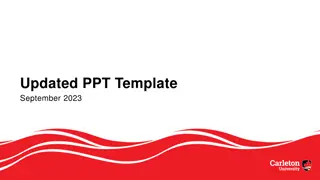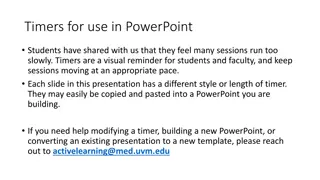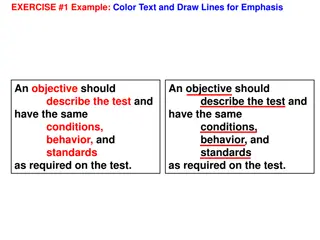
Council Meeting June 26, 2020 Agenda and Discussions
Explore the agenda of the Council Meeting on June 26, 2020, covering topics like racism, systemic injustice, and health inequalities. Dive into discussions on how these issues impact the justice-involved population with panelists from esteemed organizations. Stay updated on business meeting outcomes and public comments in this informative session.
Download Presentation

Please find below an Image/Link to download the presentation.
The content on the website is provided AS IS for your information and personal use only. It may not be sold, licensed, or shared on other websites without obtaining consent from the author. If you encounter any issues during the download, it is possible that the publisher has removed the file from their server.
You are allowed to download the files provided on this website for personal or commercial use, subject to the condition that they are used lawfully. All files are the property of their respective owners.
The content on the website is provided AS IS for your information and personal use only. It may not be sold, licensed, or shared on other websites without obtaining consent from the author.
E N D
Presentation Transcript
Council Meeting June 26, 2020
Agenda Welcome & Introductions, Roll Call 2:00 PM Approval of April Meeting Minutes Racism and Systemic Injustice: Looking at Racial Inequalities through a Health Lens: How does this Apply to the Behavioral Health Justice Involved Population 2:15 PM 2:20 PM Q&A Discussion with Council Members CCJBH Business Meeting Announcements Public Comment on Matters Not on the Agenda Adjourn 3:20 PM 4:00 PM 4:20 PM 4:25 PM 4:30 PM
2:00 PM Welcome & Introductions, Roll Call Secretary Ralph M. Diaz, California Department of Corrections and Rehabilitation and Chair, CCJBH 2:15 PM Approval of April Meeting Minutes Minutes for approval from 5.14.2020 and 4.30.2020 Council Meeting Stephanie Welch, Executive Officer, CCJBH *****PUBLIC COMMENT********
2:20 PM Racism and Systemic Injustice: Looking at Racial Inequalities through a Health Lens, How does this Apply to the Behavioral Health Justice Involved Population Panelist Discussion 3:20 PM Q&A Discussion with Council Members *****PUBLIC COMMENT******** 4:00 PM CCJBH Business Meeting Workgroup Discussion Summary of the FY 2020-21 Budget Outcomes
4:20 PM 4:25 PM Announcements Public Comment on Matters Not on the Agenda 4:30 PM Adjourn
Discussion 2:20 PM Racism and Systemic Injustice: Looking at Racial Inequalities through a Health Lens: How does this Apply to the Behavioral Health Justice Involved Population Executive Director, California Pan-Ethnic Health Network Kiran Savage-Sangwan Co-Founder and Executive Director, Los Angeles Regional Reentry Partnership (LARRP) Troy Vaughn
Discussion 2:20 PM Panelists: Kiran Savage-Sangwan, Executive Director California Pan-Ethnic Health Network
Discussion 2:40 PM Panelists (cont): Troy Vaughn, Co-Founder and Executive Director Los Angeles Regional Reentry Partnership (LARRP)
Discussion 3:20 PM Q&A Discussion with Council Members Thoughts Reactions Next Steps
Public Comment 3:40 PM Public Comment (lines open)
4:00 PM CCJBH Business Meeting Workgroup Discussion 2020-21 Budget Highlights
4:00 PM Workgroup Discussion Strategies to Improve Member Engagement-Policy and Program: a. Workgroups Staff would host calls every other month to solicit feedback from members and develop various products (analysis, fact sheets, policy recommendations). Workgroups would need to be open to stakeholders and the public. No official business would be conducted, it would need to be brought to the full council. b. Policy Advisors No more than two members would work with staff to provide input and feedback to develop various products (analysis, fact sheets, policy recommendations, etc.) but no official business would be conducted, that would need to be brought to the full council. c. Committees A formalized workgroup with Chair and Vice Chair, charter, agenda, minutes, potentially speakers and stakeholder members, as well open to the public. If there is a quorum, official council business can be conducted here.
Workgroup Discussion (cont.) Establish the following workgroups: 1. Prevention and Diversion (Intercepts 0-3) 2. Reentry and Reintegration (Intercept 4 and 5) 3. Juvenile Justice (Intercept 0-5 or prevention, diversion and reentry issues)
Workgroup Discussion (cont.) Establish Policy and Program Advisors for Critical Projects/Contracts a. Lived Experience Project (LEP) b. Data-Driven Strategies/Data-Informed Framework & Medi-Cal Utilization c. Ad-Hoc (i.e. Legislative Report Review, CCJBH Best Practice Award, Capitol Education Day, Communication/Dissemination Strategies, etc.) Revised Schedule a. Workgroup Meetings (1-2 hours) i. July, September, November 2020 b. Council Meetings (2-3 hours) i. June, August, October, December 2020
Workgroup Discussion (cont.) Suggested Policy and Program Activities and Products for 2020: 1. Prevention and Diversion Workgroup: a. Diversion in the wake of the public health and budget crisis caused by COVID-19 2. Reentry and Reintegration Workgroup: a. How do we prevent individuals who are released from returning to jail, prison and state hospitals?
Workgroup Discussion (cont.) 3. Juvenile Justice Workgroup: a. How does JJ policy progress with reduced budget and resources 4. Other a. LEP Fact Sheet, Survey and Brief on Criminal Records and Employment Barriers b. Data-Driven Strategies/Medi-Cal Utilization Analysis Fact Sheet(s) c. TBD with member input
Workgroup Discussion (cont.) Member Survey Results and Feedback: a. Prevention and Diversion i. Staff lead: Monica Campos ii. Member interest: Tony Hobson b. Reentry and Reintegration i. Staff lead: Stephanie Welch ii. Member interest: Mack Jenkins (possible policy advisor), Jessica Cruz c. Juvenile Justice i. Staff lead: Sheron Wright ii. Member interest: Danitza Pantoja, Mack Jenkins
Workgroup Discussion (cont.) FOLLOW-UP QUESTIONS: 1. Is there anyone that did not have the opportunity to respond to the survey that would like to provide feedback now? 2. Is there anyone else who would like to participate in one of the three workgroups?
4:00 PM Summary of the 2020-21 FY Budget Outcomes
Budget Highlight Governor Newsom and Legislative Leaders reached a budget deal on Monday, June 22, 2020 The deal avoids steep cuts to education and safety net programs, the first year Governor Newsom and lawmakers aim to minimize cuts by dipping into the state s rainy-day reserve, borrowing from special funds and temporarily limiting corporate tax credits to raise more than $4 billion in new revenue It is unclear whether or not the Governor will use this blue pencil to make additional cuts prior to signature
Budget Highlight Budget Deal Highlights: State employees should expect furloughs, 10% pay reduction Corrections Requires the identification of a state owned and operated prison for closure by January 10, 2021 and second state owned and operated prison for closure by January 10, 2022 Eliminates the Integrated Services for Mentally Ill Parolee Program, and proposes to adjust policies to connect individuals with community resources Sets aside $9.6 million in 2020-21, $24.7 million in 2021-22, $22.9 million in 2022-23 ..to support the realignment of the Division of Juvenile Justice
Budget Highlight Budget Deal Highlights: Judicial Branch Provides $238.5 million one-time General Fund in 2020-21 to backfill fine and fee revenue losses. $8.1 million General Fund in 2020-21 and $15.5 million ongoing to fund court navigators in trial courts Local Public Safety Provides $12.9 million General Fund to county probation departments to supervise the temporary increase in the average daily population of offenders on Post Release Community Supervision. Board of State and Community Corrections Maintains $37 million General Fund for the Adult Reentry Grant Program
Budget Highlight Budget Deal Highlights: Department of State Hospitals Incompetent to Stand Trial (IST) Off-Ramp Services, which reflects General Fund costs of $1 million in 2020-21 and $2 million annually thereafter Approves of the May Estimate for the Jail-Based Competency Treatment Program (JBCT), which reflects a reduction of General Fund costs of $3.7 million in 2019-20 and $6.9 million in 2020-21 Approves of the May Estimate for the Lanterman-Petris-Short services, which reflects increased reimbursements from counties of $5.8 million in 2020-21 and $5.8 million in 2021-22 to reflect increased referrals of involuntary civil commitments under the Lanterman-Petris-Short Act.
Budget Highlight Housing and Homelessness Homeless Housing, Assistance, and Prevention (HHAP) program Round 2--$300M Project Room Key --$550M CARES Act Housing First and CDCR Housing Navigator Program and Suspension
LegislativeUpdate Legislative Calendar: July 2-13 Summer Recess July 31st Last Day for Policy Committee and Report Fiscal Bills August 7th Last Day for Policy Committee and Report Bills August 14 Last Day for Fiscal Committee and Report Bills August 17-31 Floor Session Only August 21st Last Day to Amend Bills on Floor August 31st Last Day for Each House to Pass Bills September 30th Last Day for Governor to Sign or Veto Bills November 3rd General Election November 30th Sine Die December 7th Convening of 2021-22 Regular Session
LegislativeUpdate CCJBH began the legislative cycle following 211 bills and monitoring 29 priority bills. Of the 29 bills 7 bills are moving in this legislative session due to COVID-19 and the shift in the economy. AB 1950 (Kamlager) Probation: length of terms. 6/16/20 S-RLS. Existing law authorizes courts that have jurisdiction in misdemeanor cases to suspend the sentence and make and enforce terms of probation in those cases, for a period not to exceed 3 years, except when the period of the maximum sentence imposed by law exceeds 3 years. This bill would instead restrict the period of probation for a misdemeanor to no longer than one year except as specified.
LegislativeUpdate (cont) AB 2425 (Mark Stone) Juvenile police records. 6/16/20 S-RLS. This bill will prohibit a law enforcement agency in any county from releasing a copy of a juvenile police record if the subject of the juvenile police record is (1) diverted by police officers from arrest, citation, detention, or referral to probation or any district attorney and who is currently participating in a diversion program or who has satisfactorily completed a diversion program, (2) counseled and released by police officers without an arrest, citation, detention, or referral to probation or any district attorney, or (3) does not fall within the jurisdiction of the juvenile delinquency court under current state law, except as specified AB 2576 (Gloria) Mental health. 6/16/20 S-RLS. The bill would require that consideration be given to using the reallocated funds to provide services to individuals with mental illness who are also experiencing homelessness or who are involved in the criminal justice system and to provide early intervention services to youth.
LegislativeUpdate (cont) AB 2483 (Bauer-Kahan) County jails: recidivism: reports. 6/11/20 S-RLS. Existing law establishes the Board of State and Community Corrections, which, among other things, is responsible for providing statewide leadership, coordination, and technical assistance to promote effective state and local efforts and partnerships in California s adult and juvenile criminal justice system. This bill would, starting on January 1, 2023, and annually thereafter until January 1, 2027, require the sheriff in each county to compile and submit specified data to the Board of State and Community Corrections on their anti-recidivism programs and success rates in reducing recidivism. The bill would require the board to annually compile a report based upon those findings and submit the report to the Legislature by a specified date.
LegislativeUpdate (cont) SB 665 (Umberg) Mental Health Services Fund: county jails. 6/18/20 A-HEALTH Current law prohibits Mental Health Services Act (MHSA) funds from being used to pay for persons incarcerated in state prison or parolees from state prisons. The 2011 Realignment Legislation addressing public safety and related statutes, requires that certain specified felonies be punished by a term of imprisonment in a county jail, rather than the state prison, and provides for mandatory supervision, a period of suspended execution of a concluding portion of the sentence that is supervised by the county probation officer. This bill would, until January 1, 2023, authorize a county to use MHSA funds, if that use is included in the county plan, to provide services to persons who are incarcerated in a county jail or subject to mandatory supervision, except persons who are incarcerated in a county jail for a conviction of a felony unless for purposes of facilitating discharge.
4:20 PM Announcements 4:25 PM Public Comment on Matters Not on the Agenda






















